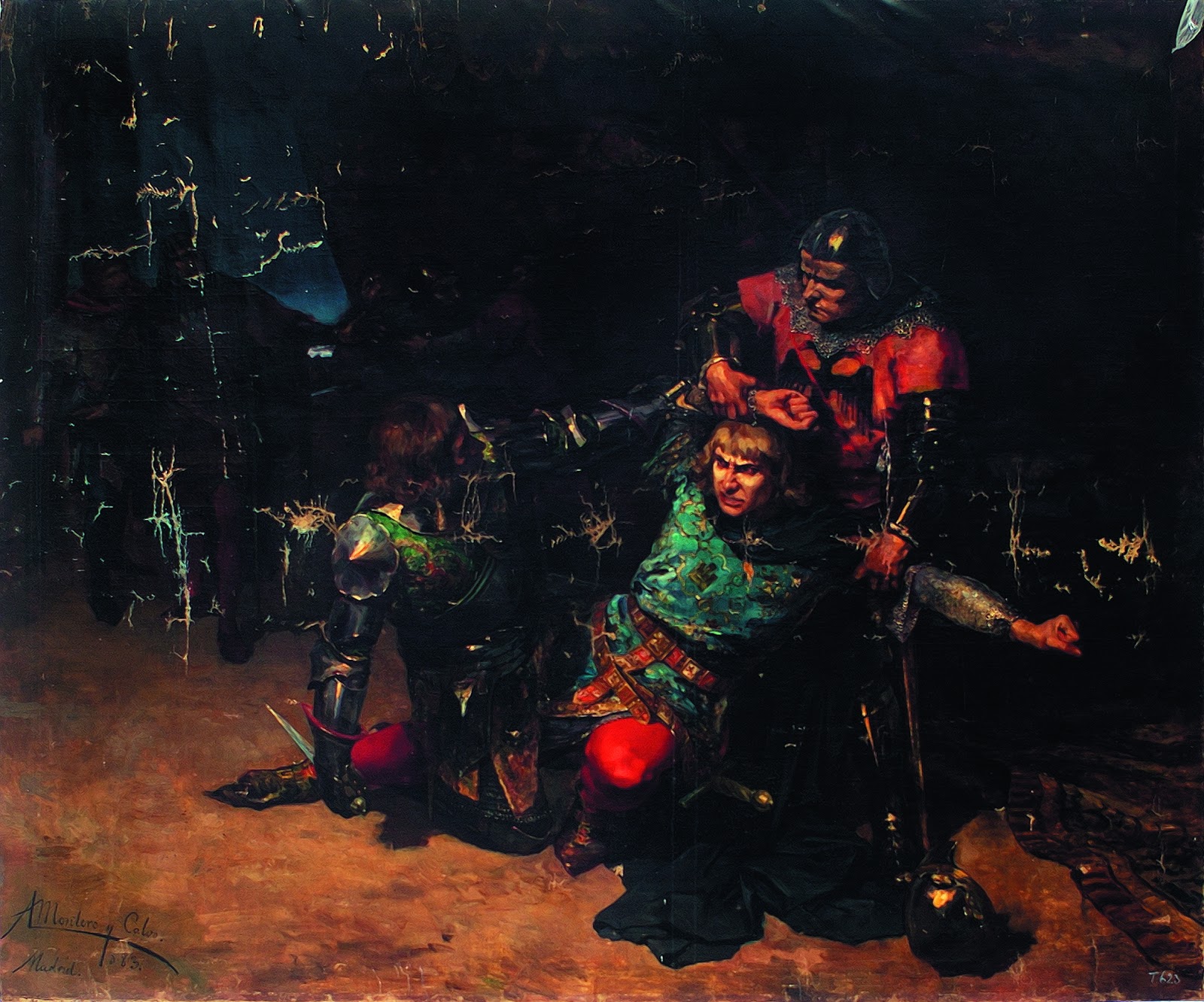
Seminar. Female Histories: Women on Stage and Behind the Scenes in Premodern Spain
Seminar 25 February 2020 in Odense at the Convent of Noble Maidens co-organized by the Centre for Medieval Literature and the Historicity Research Group at the University of Southern Denmark
Image: Pedro I de Castilla (1334-1369), known as "Peter the Evil One", is murdered by his stepbrother. Montery y Carlo. Copyright Wikimedia Commons
The seminar is organized by the Centre for Medieval Literature and the Historicity Research Group.
Contact: Rasmus Vangshardt (rv@sdu.dk)
Program
| 13:00 |
Associate professor Sofie Kluge: Introducing Sacramento Roselló |
| 13:05 |
Dr. Sacramento Roselló (Affiliated Researcher, CML; lecturer, KU): “Of Traitors and Womanizers: Pedro the Cruel on the Early Modern Stage” |
| 14:00 | Coffee |
| 14:15 |
Dr.phil. Else Marie Bukdahl: Introducing Elizabeth Cruz Petersen |
| 14:20 |
Dr. Elizabeth Cruz Petersen (Florida Atlantic University): “Defusing Fake News: Women in Command in Early Modern Spanish Theater” |
| 15:15 | Joint Q&A |
| 15:45 | Reception |
Abstracts
Dr. Roselló
In the late 14th century King Pedro I of Castile (1334 – 1369) and his half brother Enrique de Trastamara (1334 – 1379) were locked in a deadly struggle for power that culminated with Pedro’s assassination and the beginning of the Trastamaran dynasty. The Trastamaras ruled until the 16th century without ever fully clearing their name, and therefore their legitimacy, from the Petrists affair. The events surrounding Don Pedro’s reign, in particular his abandonment of Blanche of Navarre and his doubtful marriage to Maria de Padilla, gave rise to a Petrist rhetoric in which womanizing and treacherous behavior became a metonymy of his tyrannical rule. As had happened before with works reflecting on moments of national conflict (i.e., the fall of Spain or the legend of Don Rodrigo), historical plays on Pedro the Cruel presented his sexual predatory behavior as a sign of more general tyrannical tendencies. In these plays mixing politics and romance, historical or historically inspired female characters function as catalysts for the behavior of the king within an acceptable – or not – form of government. Repeating their role in the chronicles that described the period, they become figures which serve the purpose of explaining, justifying and at times inspiring the behavior of the King.
Studies of Golden Age plays dedicated to the topic of King Pedro are scarce and seldom apply a gendered critique. The work of dr. Lomba y Pedraja represents an exception, offering a first attempt at identifying and thematically classifying a series of plays penned by Lope de Vega, Calderón de la Barca, Tirso de Molina and others. This lecture will revisit his taxonomy and consider how the topic of treason is worked through the characterization of female historical figures.
Dr. Cruz Petersen
Few scholars outside the field of early modern Spanish theater are aware of the significant role women played in the rise of Spain’s commercial theater. This is especially astonishing in light of the fact that from 1540 to 1710 approximately 11 percent of all commercial theater directors and managers in Spain were women, contrary to their European counterparts such as in France or England, where until 1660 women rarely participated as theater professionals. In Spain, thirty-two women ascended to the role of director/manager between 1643 and 1706. This lecture focuses on one of the theater impresarios, María Álvarez, who counts among the members of this elite group. She forms part of an emergence of female entrepreneurs during seventeenth-century Spain who commanded the most important positions in theater, possessing legal authority and responsibility for all aspects of acting companies.
This lecture is part of a current manuscript entitled Defusing the Myth: Five Extraordinary Businesswomen in Seventeenth-Century Spanish Theater that further explores the life of María Álvarez and four of her business comrades, Margarita Zuazo, Fabiana Laura, Francisca López, and Bárbara Coronel. In its attempt to reinstate the names of these dynamic women in the historical canons, this study reveals the artistic, political, and cultural conditions of women in the theater. It explores the exceptional resources they required for running their organizations as bona fide businesswomen: negotiating contracts with actors, playwrights, stage crew, and the managers of the public playhouses and palace theaters, commissioning plays, scheduling and securing rehearsal and performance venues, reviewing promotional materials, handling the bookkeeping, as well as acting as dramaturges, designers and directors. It also exposes their strengths in persevering personal and professional adversities —from abusive marriages and bankruptcy to murder and imprisonment.